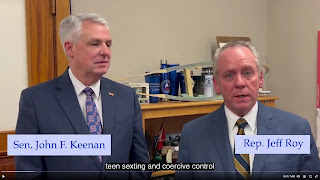The Massachusetts House of Representatives today (Wednesday, January 10, 2024) passed legislation that combines several separate legislative initiatives into one bill that will help to prevent abuse and exploitation, while also enhancing protections for survivors. The legislation addresses teen sexting and image-based sexual assault, commonly referred to as “revenge porn;” expands the definition of abuse to include coercive control for the purposes of obtaining a restraining order; and extends the statute of limitations for certain domestic violence offenses from six years to 15 years.
“This legislation modernizes our criminal laws by ensuring that those who share explicit images of others without their consent face punishment, while also educating minors on the dangers of sharing explicit images of themselves rather than imposing some of the criminal justice system’s most severe consequences,” said House Speaker Ronald J. Mariano (D-Quincy). “I’m also incredibly proud of this legislation’s bolstered protections for survivors, including the added consideration of nonphysical forms of abuse for those seeking restraining orders from their abusers. I want to thank Chairman Day and the Judiciary Committee, along with each bill sponsor and all my colleagues in the House for prioritizing this vital legislation.”
“The House has heard the urgent call of survivors to enhance protections and ensure that our laws keep up with technology. But the House doesn’t just listen, we act,” said Representative Michael S. Day (D-Stoneham), House Chair of the Joint Committee on the Judiciary. “It’s critical that these reforms pass into law quickly so that victims of coercive control, adolescent sexting and revenge porn aren’t left without relief.”
Currently, minors who possess, purchase, or share explicit photos of themselves or other minors are charged with violating Massachusetts child pornography laws and are required to register as sex offenders. The legislation passed today instead authorizes commitment to the Department of Youth Services (DYS), but also allows minors to be diverted to an educational program in lieu of criminal punishment. A district attorney, however, is allowed to petition the court to bring criminal charges in extreme cases.
The educational diversion program, to be created by the Attorney General in consultation with the Department of Elementary and Secondary Education (DESE), DYS, and the District Attorneys Association, would provide teenagers with information about the legal and nonlegal consequences of sexting, which would be made available to school districts. DESE should also encourage districts to implement media literacy programs in their schools as a prevention measure.
“This legislation represents a coordinated effort and a holistic approach to address an increasingly prevalent behavior and provides mechanisms to protect individuals victimized by those who threaten, intimidate, and harass the subjects of these images,” said State Representative Jeffrey N. Roy (D-Franklin), a lead sponsor of the bill. “The sexting provisions provide law enforcement officers with a middle ground that will allow them to educate kids about the consequences of their actions without ruining their lives. It will have a tremendous impact on people who have become entangled in the web and transmittal of images that can cause traumatic and lifetime harm through a diversion program that will educate them about the legal and personal consequences of this behavior.”
In addition to teen sexting, the bill addresses the nonconsensual distribution of explicit images by adults by establishing a penalty in the existing criminal harassment statute, including up to two and a half years of prison time and/or a monetary fine of up to $10,000. The bill increases the upper limit of the fine for criminal harassment from $1,000 to $5,000. Under this bill, a victim may also petition the court for a harassment prevention order against a person who has violated this statute.
The bill passed today also adds coercive control to the definition of abuse. Coercive control is a nonphysical form of abuse which includes a pattern of behavior, or a single act intended to threaten, intimated, harass, isolate, control, coerce or compel compliance of a family or household member that causes the family or household member to fear physical harm or to have a reduced sense of physical safety or autonomy. Examples of coercive control include threating to share explicit images, regulating or monitoring a family or household member’s communications and access to services, and isolating a family or household member from friends or relatives.
"Protecting victims is the driving force behind these efforts and I am pleased we are giving prosecutors more tools to deal with these disturbing and dangerous situations. Thank you to Speaker Mariano, Chair Michlewitz, Chair Day, and the advocacy groups who recognize how important it is that we further protect victims by updating our criminal laws," said Representative Richard M. Haggerty (D-Woburn), a lead sponsor of the bill. "By defining coercive control as abuse and closing revenge porn consent loopholes, this law protects against the severe emotional harm too often inflicted through non-physical tactics, sending a clear message that revenge porn, coercive control, and criminal harassment have no place in Massachusetts.”
“Far too often, our legal system has failed victims of domestic violence who are subjected to the unseen tortures of psychological and emotional abuse,” Representative Meghan Kilcoyne (D-Clinton), a lead sponsor of the bill. “I am so grateful that with this piece of legislation, we will be giving our law enforcement and judiciary the necessary tools to ensure those subjected to both physical and emotional abuse are protected. I am thankful to the Speaker and Chairman Day for their leadership. “With this bill, we can make sure victims of coercive abuse will no longer suffer in silence.”
The legislation passed today also extends the statute of limitations for assault and battery on a family or household member or against someone with an active protective order from six years to 15 years. This change brings the Massachusetts statute of limitations for these domestic violence offenses in line with the statute of limitations for rape, assault with intent to commit rape and sex trafficking.
“Massachusetts can and should be granting restraining orders for coercive control, but we know that for so many survivors, their emotional and psychological trauma is not given the same seriousness as physical violence. And the reality of that barrier can be deadly,” said Representative Natalie M. Higgins (D-Leominster), a lead sponsor of the bill. “I am incredibly grateful to the Speaker and my House colleagues for taking a critical step forward in protecting our neighbors by codifying coercive control in the Mass General Laws and extending the statute of limitations so that survivors of domestic violence can build more safety and supports to come forward and report domestic abuse to law enforcement.”
“Domestic violence is not always physical violence, sometimes it’s much more insidious. During my time as a legal services attorney, I represented many survivors who suffered emotional trauma and financial devastation through fear and manipulation. Survivors and the courts need our help to update our laws to make it clear that coercive control is a type of domestic abuse that will not be tolerated,” said Representative Tram Nguyen (D-Andover), a lead sponsor of the bill. “I want to thank Speaker Mariano, Chair Michlewitz, and Chair Day for advancing this transformative and bipartisan legislation. I am also grateful for the partnership of Rep. Higgins, who co-filed this legislation with me, and the survivors and coalition advocates who spoke up for the thousands of women, men, and children in our Commonwealth who would be better able to take back control of their future if this bill is signed into law.”












